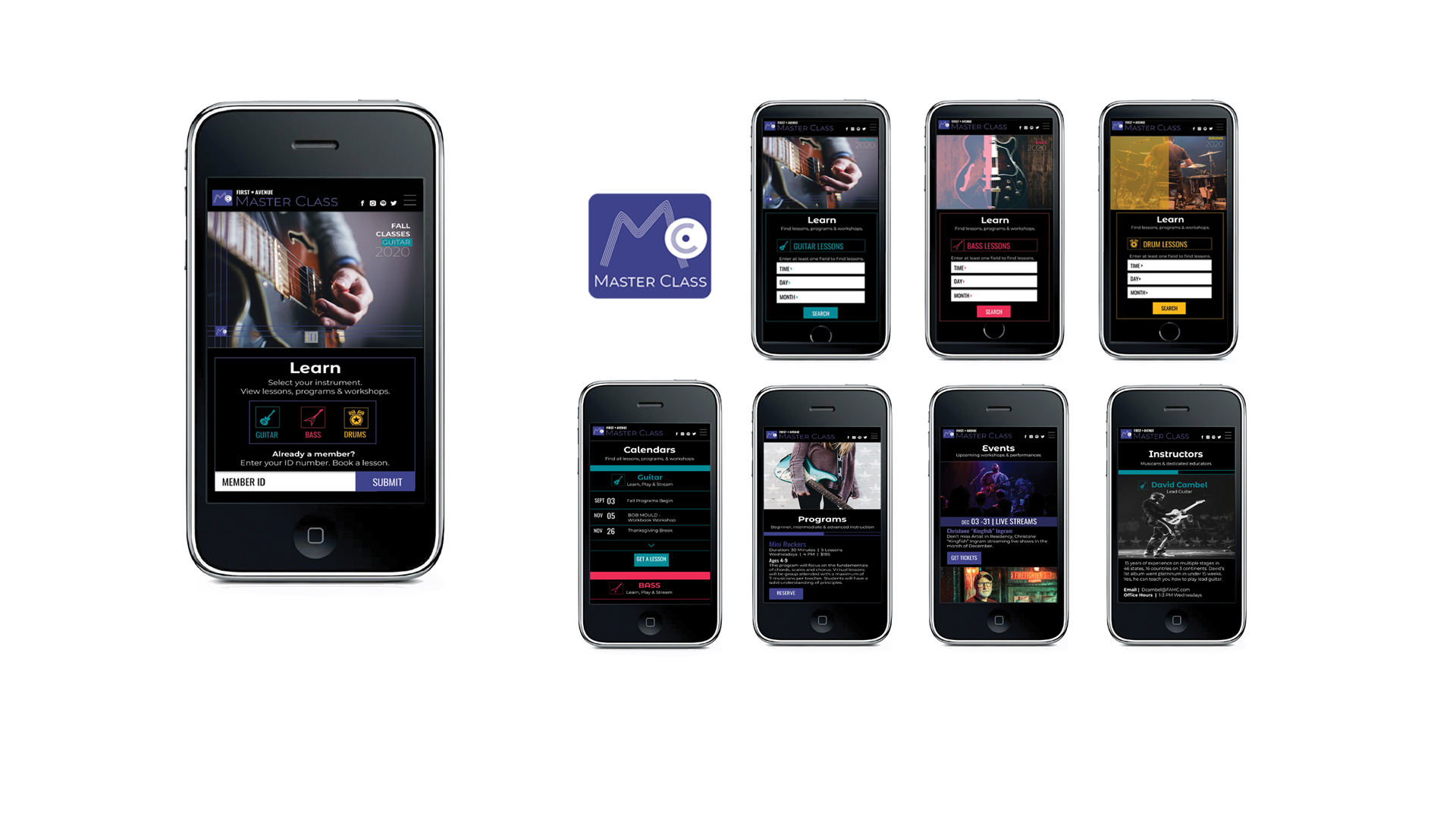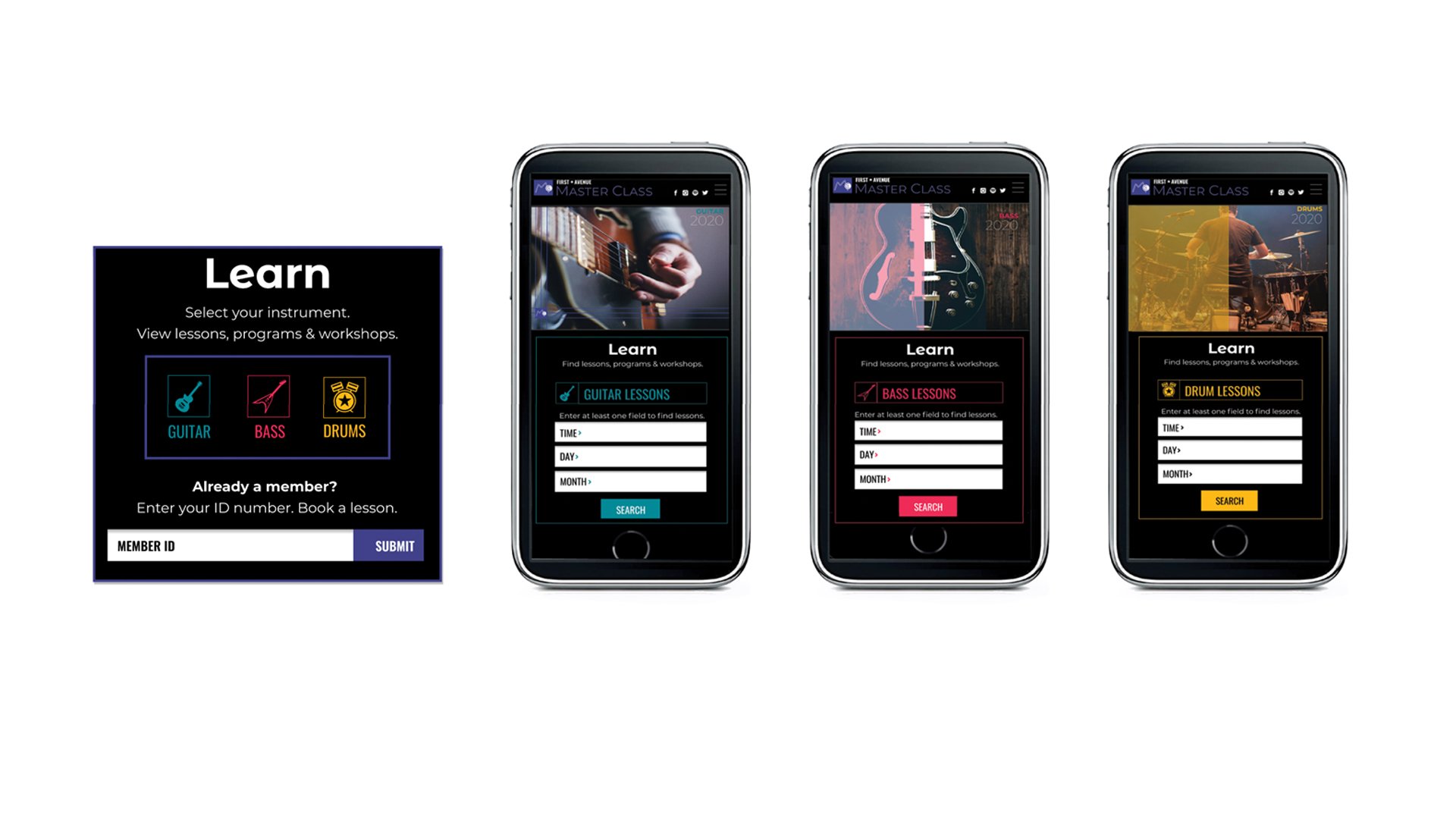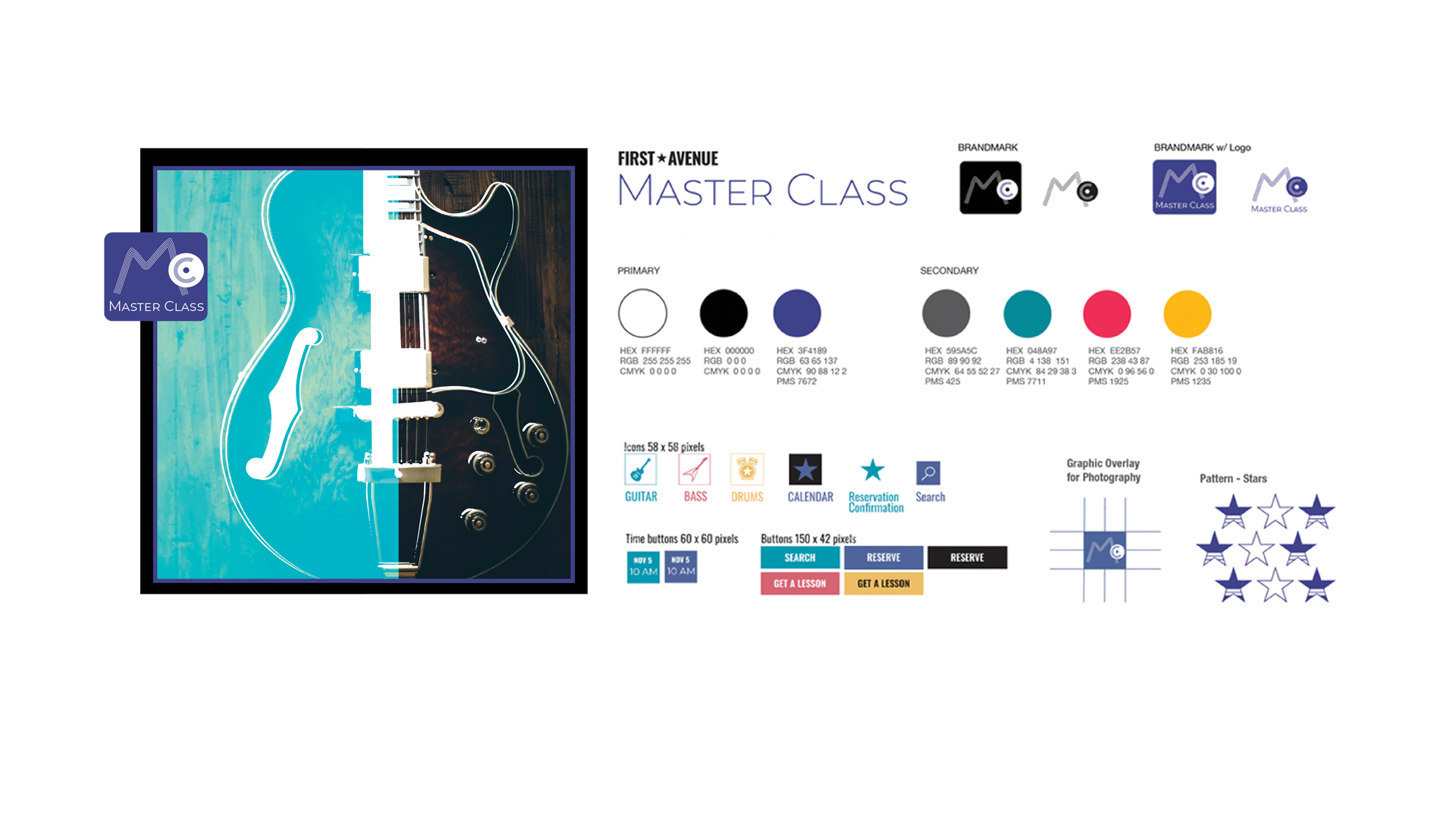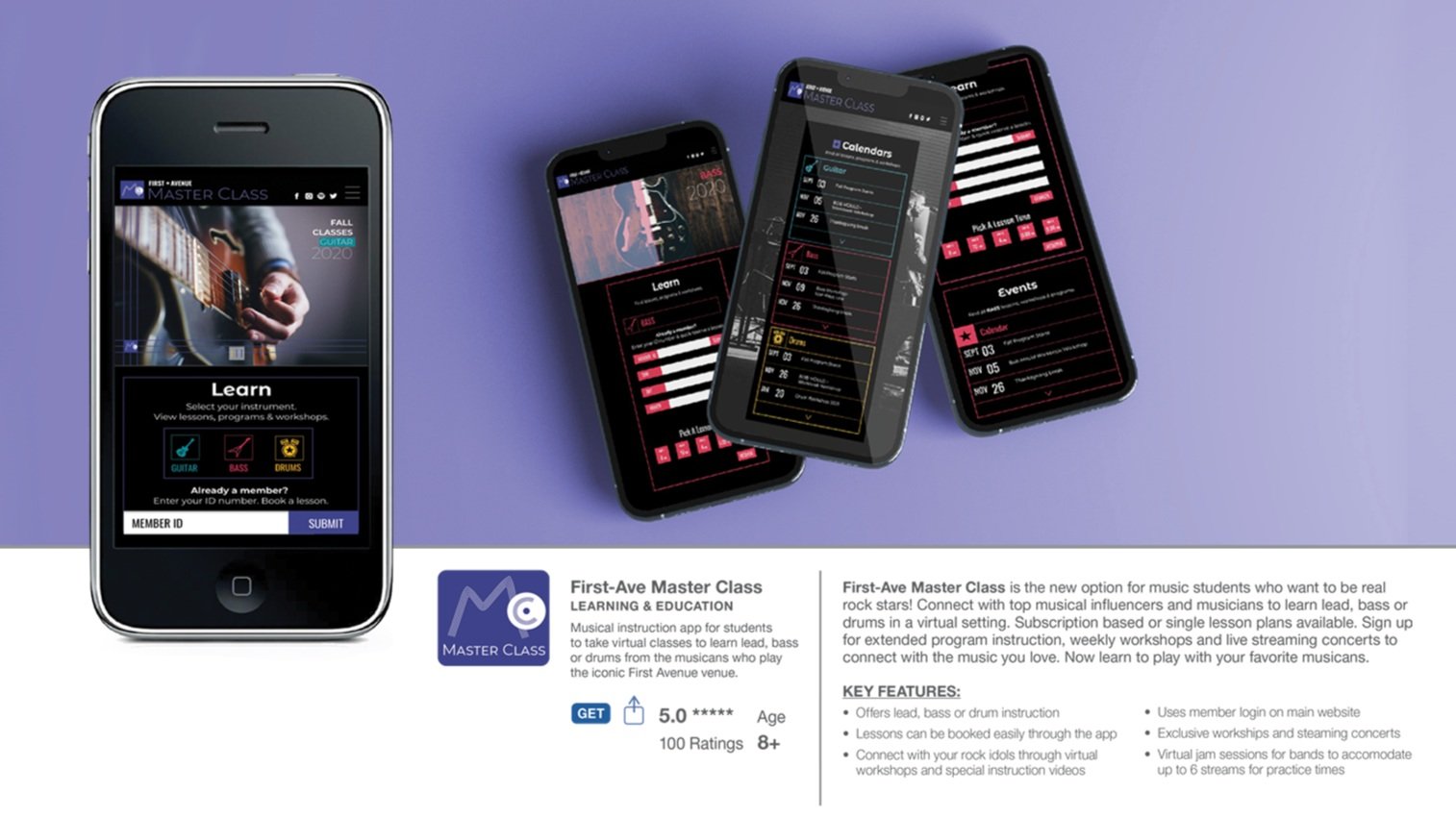First Avenue Master Class
A mobile & desktop case study explores modernizing an iconic brand and introducing a new target audience to bridge virtual musical education with master musicians during a pandemic. As a nationally recognized music venue and thriving staple in the Minneapolis music scene, First Avenue shuttered its doors as the world faced a global pandemic.
Role
Strategist to identify a new target audience to generate a new source of income that is sustainable beyond a pandemic to add value to an iconic venue
Product designer responsible for transforming the current brand into a modern theme that is member focused, offers multiple opportunities to attract young audiences providing a rock star experience.
UX & UI designer crafting a seamless user experience that is provides an engaging educational opportunity for student musicians during a global pandemic.
Tools
Figma for product design, wire framing, user flows, personas, prototypes and user testing
Adobe Illustrator & Photoshop for design assets,
branding and iconographyGoogle Forms, Documents, Sheets & Slides for content strategies and presentations for final design refinements

Prompt
In March of 2020, venues worldwide were closed indefinitely ending all in-person live concerts everywhere. At the same time, schools adopted distance learning as the pandemic raged on. Band rooms, studio equipment and one-on-one lessons with their teachers were unavailable and sat silent. Performances and interaction with their band was also absent from daily routines.
The First Avenue music venue in downtown Minneapolis, MN needed not only a brand refresh with a mobile-first approach that included a new target market that could generate a new revenue stream.
The public school system also was struggling with their music students being isolated and teachers overwhelmed with classes taught online in large groups with instruments and varying home dynamics for student practice studios.
A global problem, a business problem and a music education problem all rolled into one. My goal was to adjust an iconic business’s main revenue stream to survive during unprecedented times and find a way to educate young students and bands virtually in a new fun way.
Features to include:
Popular influencers want to connect with their fans, let them by offering Master Classes with them
A single app for First Avenue could provide members access to multiple opportunities
Virtual music lessons filled a gap for a young market and could offer live, recorded, scheduled and on-demand options
Workshops and residencies are great ways to provide additional content and revenue that gave musicians revenue generating opportunities
Target audiences of children to young adults aged 8-24 can be sustainable members for years to come, as many surveyed people had been members of First Avenue for over 15 years.
Parents were willing to pay for lessons and embraced the idea of virtual bands, iconic artists engagement and supporting First Avenue if asked, engage more with social channels and ask
Existing membership of parents makes payments for lessons easy by providing a family membership with new sub-brand availble to connect and log into with existing credentials for parents and students

Challenges & Opportunities
Research & Development
Research of the competitive landscape in music education helped to establish needs of a young audience. Viewing music instruction websites for top schools provided the basics for determining learning objectives. User surveys and interviews with students aged 10-24 helped to identify needs and preferences for musical education. Lead guitar, bass and drums were chosen as the most appropriate for the iconic rock venue. Artists who had played at First Avenue were available to teach these instruments. A campaign on popular social channels to “Become a Rock Star” would be a popular topic for young audiences. A site audit revealed the need for an updated user experience and could allow a new microsite architecture to be developed for the First Avenue Master Class sub brand.
Website
I was able to refine designs for tablet, desktop and mobile to meet user needs and set up a viable product. UX/UI components were assembled and branding for the new Master Class app too shape. Multiple screens were created to appeal to a young demographic including not only music instruction but also upcoming workshops with musicians, streaming concerts, artist residencies with exclusive content, the return of Band Camp, and even a new Youtube channel. A Master Class app and a website refresh could help elevate the existing brand into a new opportunity of sustainable revenue and demographic even after the pandemic.
Mobile First Approach
Additions of third party apps to provide more mobile giving was key. Enabling SaaS systems would create an agile charity with minimal staff to fundraise smarter. Use of digital forms to manage profiles, rounding up to purchases to donate, using QR codes for direct links to donate, announce and fuel partnerships. Social sharing of donations and more charitable storytelling would create feel good moments that resonate to donate.
Delivering virtual musical instruction solutions
A connection between the students need for virtual instruction and First Avenue’s battle to stay open in a new capacity provided an opportunity to align the needs of both to solve each of their problems. First Avenue Master Class was created to offer new services to an untapped student market that brings two groups together utilizing the iconic reputation and connections of 50 years of music that only First Avenue offers. Musicians who cannot play live concerts and students who need musical training. The brand loyalty First Avenue holds is invaluable. The numerous connections are literally written on the outside walls. It is a trusted industry leader in providing quality musical entertainment. Now it offers quality musical instruction.
A multitude of diverse artists and industry pros will offer virtual workshops, lessons and live streaming performances. Programs and events are tailored toward students aged 10-24 who most likely would be life-long members. Master Class introduced a new sub-brand that embraced digital and social trends to offer new ways to learn virtually. Students could utilize existing memberships, which would make it easy for parents to buy lessons, subscriptions, virtual programs, attend mini workshops or purchase passes to live streaming concerts. Content could be made available at multiple touch-points including on the new First Avenue Master Class YouTube channel, through the app or on the website. Members will be able to easily book guitar, bass and drum lessons with just a few clicks making it an easy app to navigate.
And during the pandemic, the First Avenue venues because they were large and unoccupied by crowds, could be retro-fitted to become a place for artists to utilize the sound system, cameras and recording equipment to live stream workshops, lessons and performances with a social distancing protocol in place. The venue is also well suited to divide up into individual studio spaces for lessons and socially distant band practices until large crowds and school bands can safely gather again. The ability to continue offering the Master Classes is a sustainable revenue option for years to come.

















